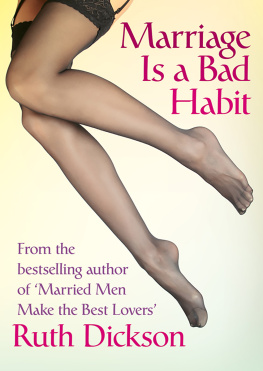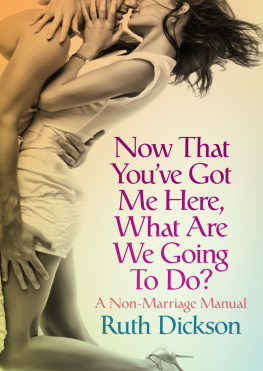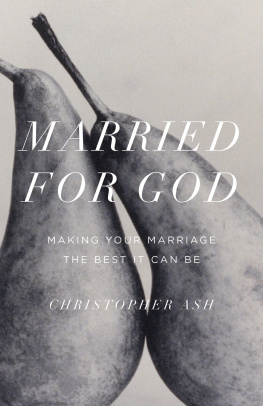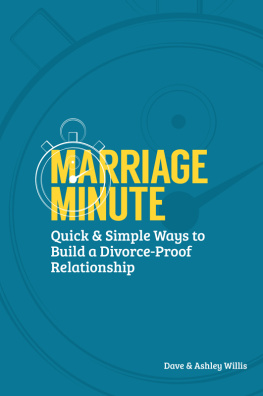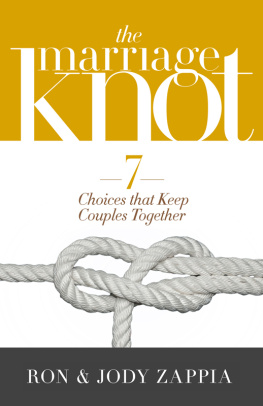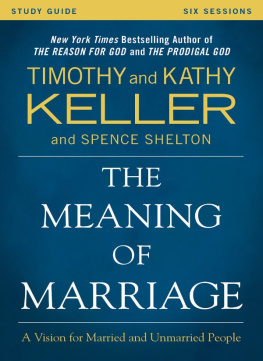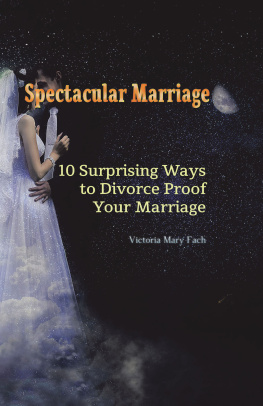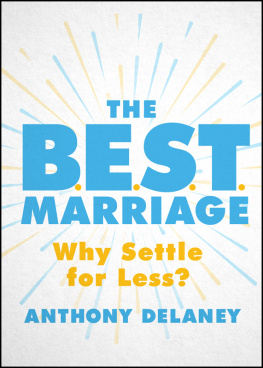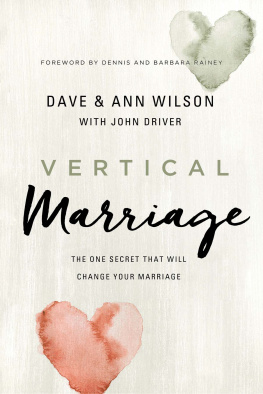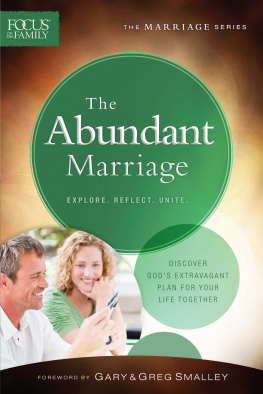Marriage Is a Bad Habit
Ruth Dickson

FOREWORD
Until quite recently, it was a generally accepted premise that all girls, upon maturity, would find a man, marry him, bear his children and live more or less happily ever after. Regardless of talent, ambition or sexual orientation, female children were expected to marry shortly after becoming nubile; college and/or employment were acceptable alternatives for a few years, but those options were primarily chosen as means to the end of locating a marriageable man.
Aside from the social rules, economics played a large part in the universal rush to the altar. It was virtually impossible for a woman to earn a decent income, limited as she was to a few acceptable positions: teaching, nursing, lower-level office work and the like. In 1969, women comprised only 9% of the total medical school enrollment in the U.S. and most of the Ivy League schools like Harvard, Yale and Princeton didnt accept women at all until the seventies. I was the butt of many jokes and insults when I announced my intention to attend Cornell (the only co-ed Ivy in 1942) to study veterinary medicine, where I became the first female ever to attempt a DVM there. Unfortunately (or not, depending on the future health of the lions and tigers and bears I had wanted to treat) I became as caught up in the furor of man-trapping as everyone else, as, after a three-year drought, we were suddenly inundated with a flood of glamorous returning war heroes, courtesy of the G.I. Bill.
I wont regale you with the story of my life after college, fascinating though it might be; suffice it to say I ended up in frantic lust with a hot ex-bombardier, married him and from there on up, it was downhill all the way. Seven years, two kids and two incidents of physical abuse later, I was out of there and never looked back.
Aside from a brief second marriage, I have been single for the greatest part of my 87 years and have not regretted one second of my unmarried state. Unbounded curiosity has led to a nomadic life, sending me from coast to coast and around the world, allowing me to observe the personal and social implications of the institution of marriage as practiced in a multitude of societies. And no matter where I looked, one thing was universally true: the institution of marriage is the one custom that has, without fail, kept women in a subservient, second-class position.
Even today, after thousands of years of progress, there are cultures that refuse to accept half the population as being fully human, although most first world countries have finally granted female suffrage and a grudging equality of education and access to most professions. However, the political arena, especially in the United States continues to be woefully short of female representation, as do other high profile careers. And in all cases women still earn less than men in comparative positions. These social factors are both the cause and effect of girls need to find men to husband them.
The new millennium, however, has brought some interesting changes. More children are born out of wedlock than ever before in our history, with little or no onus attached to the circumstances of their birth. Marriage itself is dropping like a hot rock: According to a recent Pew Report, ...in 1960, two-thirds (68%) of all twenty-somethings were married. In 2008, just 26% were. How many of todays youth will eventually marry is an open question. For now, the survey finds that the young are much more inclined than their elders to view cohabitation without marriage...
With this in mind, it is easy to foresee the day when weddings will be as quaint as dial telephones, looked upon as relics of the days during which this book was first written. Although I never considered myself a prophet, it appears I was experiencing a prescient glance at the future when I suggested that marriage is indeed a bad social habit.
A parting thought: In a recent Mad Men episode, Betty Draper is talking with her only divorced acquaintance. Betty asks what its like to live without a husband, to which the friend replies, the hardest part is realizing youre in charge. At which I heard myself murmuring to the TV set, No, nothe hardest part of marriage is realizing youre not in charge!
CHAPTER ONE
Whos Hiding on the Premises?
A system could not well have been devised more studiously hostile to human happiness than marriage. Shelley
Some forty-odd (some odder than others) years ago, I accomplished a small volume called Married Men Make the Best Lovers, which you are probably too young to have read. If so, ask your mother, or perhaps your grandmother to tell you the tale of the Outrageous Woman who became the scourge of the suburbs wherever disreputable books were sold.
Now, a book with a title like that is bound to raise some hackles, not to mention eyebrows and blood pressure, but I never expected it to result in the turmoil of which I rapidly became the vortex. Suddenly, I was being introduced as Controversial Ruth Dickson, as though Controversial were my first name, and the ensuing furor continued for years. However, not all the comments were negative, and some of the more penetrating remarks reinforced my contention that adultery is not the cause of poor marital relations, but rather the reverse. If there werent something wrong with our system of marriage, adulterous relationships would not be as prevalent as they are; and obviously, there lay the real root of the problem.
As the nations wives heaped scorn and curses upon my head, it became more and more apparent that they were operating not only from fear, but from a deep-seated anxiety about matrimony itself. Those who shouted the loudest were obviously those who were the least secure in their belief that marriage was a desirable state. They seemed to be saying, Im in this mess, and Im not going to withstand it alone. Therefore, everyone damn well better get in it with me, most especially you, Ms. Controversial! Because I said I felt women had something better to do with their lives than subjugate themselves to men, I was called evil. And because I stated flatly that I was far happier living alone than with a husband of my own, I was labeled sacrilegious. It seems like a pretty sad commentary on our society that the people who comprise it, especially the female contingent, are so frightened that they feel called upon to react so strongly to one womans opinions.
No matter. Marriage as we know it is going down the drain, and nobody is more aware of that fact than the wives who are so desperately trying to make it work. And for this reason, I thought it high time somebody shed the light of sense on whats really happening to this fast-disintegrating system, and why. You arent going to like it, any more than you liked the Surgeon Generals report on smoking. Nobody likes to break a habit, no matter how damaging it might be, and I know perfectly well that nothing is going to change as a result of this book. But maybe it will make a few people think of what weve done to ourselves in the name of a religious superstition we insist on referring to as a sacred institution.
Perhaps we had best first define what were talking about when we use the word marriage. Lets see what Mr. Webster has to say about it: Marriage: the state of, or relation between, a man and woman who have become husband and wife, or the ceremony marking this union. Well, that doesnt tell us much, so lets see what he means by husband, okay? Ah, now were getting somewhere. Husband: married man; the manager, as of a household; to manage economically; conserve. Does that begin to tell you something? Lets try wife, shall we? Wife: from the Anglo-Saxon wif, meaning the hidden or veiled person; a woman in relation to her husband. Still true in certain mid-Eastern countries, but hardly the norm in the Western world.

